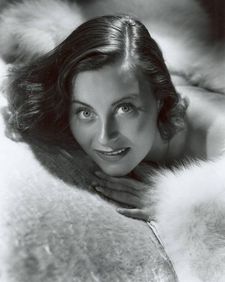 |
| Michele Morgan - in her heyday |
The French actress Michèle Morgan, who was the unforgettable partner of Jean Gabin in Le Quai Des Brumes, died today in Paris at the age of 96.
Born Simone Renée Roussel on 29 February 1920, Michèle Morgan began her career in 1935 as an extra in La Vie Parisienne directed by Robert Siodmak, and in Mademoiselle Mozart by Yvan Noé, in which the title role was taken by Danielle Darrieux.
She decided to take her craft seriously, enlisting in the stage school Cours Simon where she learned the essentials of acting - and paid for her studies by continuing to take small roles in films.
Then in 1937 she made her mark in Gribouille by Marc Allégret and ascended to mythic status when (in Le Quai Des Brumes) Jean Gabin remarked “Tu as des beaux yeux, tu sais …” (“You know you have beautiful eyes …”) to which she replied: “Embrasse-moi.” (“Kiss me.”). The partnership continued in Remorques by Jean Grémillon in 1940.
She was exiled to Hollywood during the Second World War where she made several minor films but performed well opposite Paul Henreid and Humphrey Bogart in the patriotic Jeanne De Paris in 1942 (directed by Robert Stevenson) and then Passage To Marseille two years alter, directed by Michael Curtis.
Returning to Paris after the Liberation, Michele Morgan received a Best actress award at the Cannes Film Festival for playing a blind woman in an adaptation by Jean Dellanoy of André Gide’s novel La Symphonie Pastoral. She herself was part of the Cannes Film Festival jury - as president in 1971 and as a jury member the following year.
She proved her stellar quality in both European and French cinema with stand-out performances in The Fallen Idol (1947) by Carol Reed, Fabiola (1949) by Alessandro Blasetti, L’étrange Madame X (1950 - Jean Grémillon), Maria Chapdelaine (1950 - Marc Allégret), Les Orgueilleux (1953 - Yves Allégret, Napoléon - Sacha Guitry), Les Grandes Manœuvres (1955 - René Clair), Le Miroir à Deux Faces (1958 - André Cayatte), Landru (1962 - Claude Chabrol), Constance Aux Enfers (1963 - François Villiers) and Benjamin Ou Les Mémoires D’Un Puceau (1967) by Michel Deville.
She took a break from cinema to pursue painting, poetry and designing a collection of ties. Claude Lelouch finally persuaded her to abandon of her self-imposed exile and brought her back to the screen with a role in Le chat Et La Souris in 1975, in which she was teamed with Serge Reggiani. She received a career accolade from the Academy of the French Oscars, the Césars, in 1992 while the Venice Film Festival accorded her a similar tribute in 1996. She is one of the rare French talents to find a place and a star on Hollywood’s Walk of Fame, which she was awarded in 1960.
She was married to William Marshall from 1942 to 1948, actor Henri \Vidal (1950 to 1959) and actor-director Gérard Oury from 1960 until his death in 2006. She published her memoirs in 1977 under the title Avec Ces Jeux-Là.





















